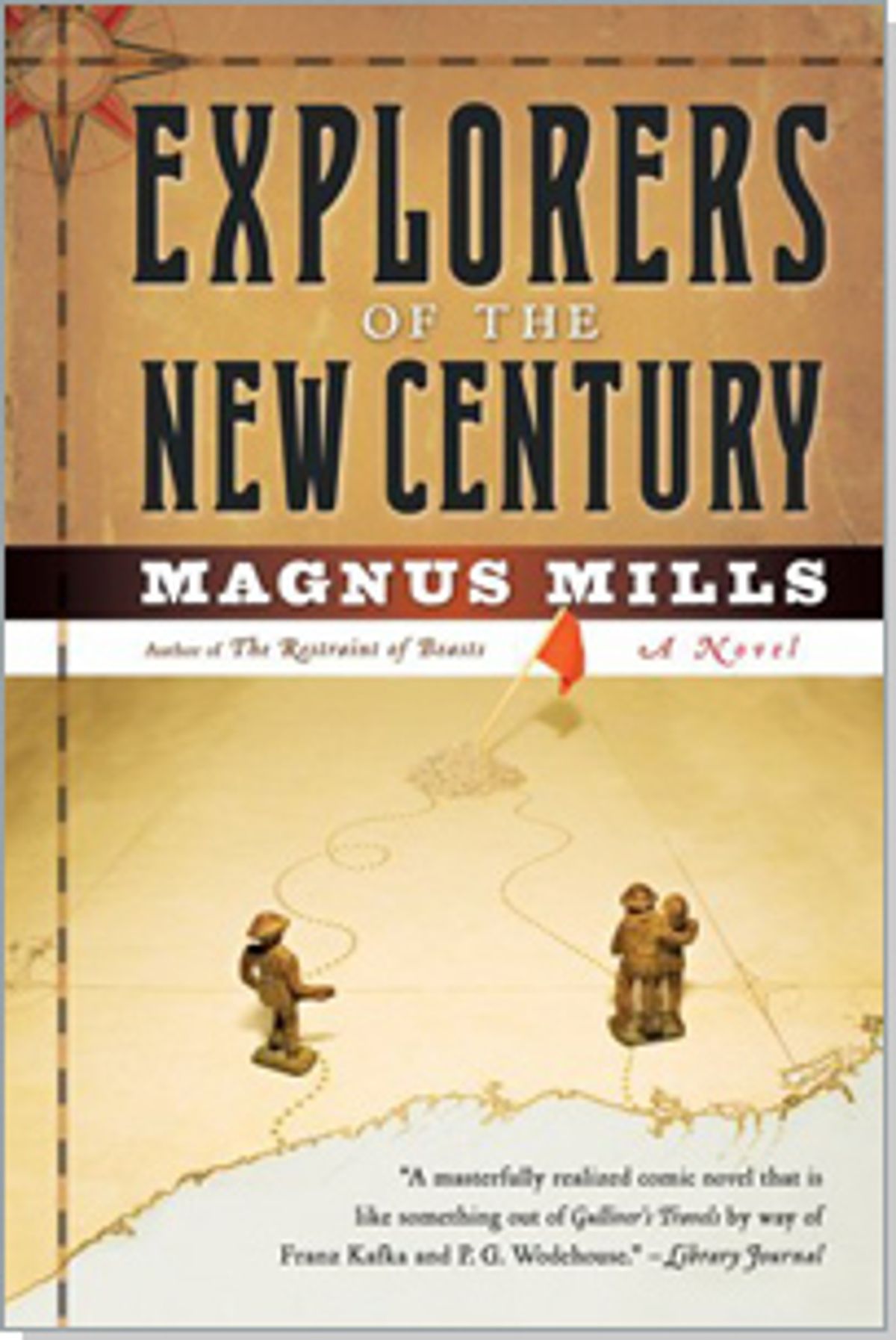We do love tales of valiant explorers, braving ice, death, rough seas, brutal weather and the weakness and perfidy of their fellow man. At first, this seems to be just what Magnus Mills plans to deliver in his new novel, "Explorers of the New Century." Mills is known for the off-kilter, parable-like qualities of his fiction, so you know this won't be a conventional adventure story, but there are enough unexplained elements in the book from the very start to suggest where he might take things.
We don't, for example, know where the novel is set. Two separate expeditions set out from a dismal beachhead toward the heart of a bleak, unnamed continent. This is a landscape so miserable that even the snow shuns it, miles upon miles of stony, wind-scoured terrain without a shred of green or any other sign of life. Water is hard to come by, except in the form of raging, nearly impassable rivers. The place must be near a pole because the expeditions trudge across this no man's land through dark days with the sun appearing only as a dim noontime glow on the horizon. The goal of both expeditions, we eventually learn, is the AFP, the Agreed Furthest Place. From civilization, that is.
Then there are the expeditions themselves. Where they come from is never specified, though one team has very British names (and manners) and the other seems Scandinavian. We know they are going where no one else has gone before because drafting maps is one of their crucial tasks. They don't have radios or any significant technology -- they're traveling with packs of mules -- so it seems that the "new century" they belong to is the early 20th. They are not supposed to be racing each other to the AFP, and the reason why it's so important they map a route to it isn't clear, but race each other they do. An expedition leader passes around a book -- by one professor F.E. Childish -- that pertains to their mission, but its title, "The Theory of Transportation," doesn't give much away.
Like any small group struggling under harsh conditions toward a very specific goal, the men don't tend to dwell much on meanings and context. Instead, they're preoccupied with the predictable spats and rivalries, and the kind of annoying minor eccentricities they'd never notice in other circumstances. There's the guy who prefers to wear his own impractical hat long after everyone else has switched to the much warmer "wooly helmets." There's the eager beaver whom nobody trusts because they think he owes his presence on the team not to merit but to political connections. There are shirkers and whiners and the guy who insists on blazing the trail so far ahead of the main group that they almost lose sight of him. There's the second in command who frets that an exceptionally competent third will usurp his position.
What is Mills getting at by leaving out the big, orienting view and focusing on these mundane details? He could be saying that this is how life works -- we concentrate on making it through each day, and the harder it gets, the less likely we are to consider why we do it. He could be satirizing the current mania for this sort of story, pointing out that the glory and heroism surrounding polar discovery or the search for a Northwest Passage is dispensable; what we really want is an excuse to eavesdrop on two guys fighting over who takes first watch.
On the other hand, the setting is so peculiar, so suggestively unlike any place any turn-of-the-century explorers actually would have visited, that it invites speculation. When one expedition leader observes, "What calamity could have struck this land?! ... What violent upheaval to drive a river completely off its course?! It is unbelievable! Never have I known such geological chaos," you have to wonder if maybe this isn't an alternate version of our own world, whose history will amaze us when it's finally revealed.
Then, about 100 pages into this 186-page book, we learn something that utterly changes our view of everything that's gone before. Some early reviews of "Explorers of the New Century" have given this revelation away, but considering that it comes more than halfway through the book that hardly seems fair. Besides, the fact that Mills can pull it off so brazenly turns out to be the real point of the novel; "Explorers" owes far more to, say, Kafka's "The Penal Colony" than it does to the various accounts of Shackleton & Co. The aforementioned point has much to do with the treachery of language, especially written language, and most especially the kind of hard, spare, polished "concrete" prose of literary realism. We think we're getting the bare bones of experience -- in the case of our explorers, experience at its most fundamental -- but we are oh so sadly deluded about that. And by extension, Mills impishly suggests, we might just be equally deluded about ourselves.



Shares